- Home
- Blog
- Database Programming
- Infosys Interview Questions

Infosys is a global leader in next-generation digital services and consulting, with its headquarters in Bangalore, India. The company was founded in 1981 by seven engineers, and since then, it has grown into one of the world's largest IT services and consulting companies, with operations in over 50 countries.
Infosys provides a range of services to clients across various industries, including healthcare, finance, manufacturing, retail, and more. These services include application development and maintenance, cloud services, digital transformation, engineering services, and enterprise solutions. The company has also invested heavily in emerging technologies, such as artificial intelligence, blockchain, and machine learning, to stay at the forefront of the industry. Therefore, if you want to succeed in this Infosys technical interview, you need to understand the technical concepts described in detail in the Infosys interview questions below. This will be beneficial for the candidates who want to do well in the interview.
Infosys Interview Questions Table Of Content
Infosys Recruitment Process
The majority of applicants at Infosys are required to meet certain academic requirements. Graduation from high school and any further colleges or universities requires a minimum 60% average.
The qualified applicants must then compete in Infosys's three-stage hiring process:
- Online Assessment Test
- Technical Interview
- HR Interview
1. Online Assessment Test
The online assessment consists of three components, each with its own time limit and minimum passing score. There are three sections to the online examination:
- Quantitative Aptitude
- Logical and Analytical Reasoning
- Verbal Ability
2. Technical Round
Questions in the technical round are based on the applicant's resume and the position they are interviewing for. You should know a lot about the following:
- At least one programming language
- Aptitude-based questions and Puzzles
- Problem-solving & Coding
- DBMS, CN, OOPS, and OS
- Algorithms and data structures
Also, you can expect to be asked about your past jobs or internships and what you did and how you helped.
3. HR Interview Round
The HR interviewer will probably be pretty friendly, so there's no need to worry. The HR round will not seem difficult if you have good communication skills. Candidates must be prepared to answer questions such as self-introduction, strengths, and weaknesses, etc.
Also, find out what you need to know about the Infosys company. Most of the time, the interviewer doesn't tell you how you did but tells you later if you got the job. You may not get an offer letter for a few days, so try to be patient.
Top 10 Infosys Frequently Asked Questions
- What do you mean by OOPs?
- What is a Class in OOPs?
- What is the difference between C and C++?
- Explain HTTP responses and requests
- What is database Schema?
- Explain RDBMS.
- Explain briefly about the SQL commands.
- What is the difference between UDP and TCP?
- Tell me about a network and a node.
- What does JAVA use for its virtual machine?
Infosys Interview Questions for Freshers and Experienced
We have organized the Infosys technical interview questions for freshers and experienced in this section. And we recommend that you read through the entire section to get a sense of the type of technical questions that will be asked in the Infosys interview. This is a face-to-face round in which questions related to the technical field will be asked.
We've put together a list of interview questions for Infosys that are based on topics. So look at it.
- Questions and Answers on OOPs
- Questions and Answers on C, C++
- Question and Answers on DBMS and SQL
- Questions and Answers on Computer Networks and Software Testing
| If you want to enrich your career and become a professional in SQL then enroll in SQL Training Course - This course will help you to achieve excellence in this domain. |
Infosys Interview Questions and Answers on OOPs
1. What do you mean by OOPs?
OOPs is the abbreviation for Object-Oriented Programming. OOPs, involve creating objects that contain both data and methods, whereas procedural programming involves the creation of data- and method-containing procedures and methods. OOPs enables programmers to represent real-world scenarios with objects.
[ Releted Article - OOPs Interview Questions ]
2. Why do you use OOPs?
- OOPs enable programming clarity, which simplifies the solution of complicated problems.
- Through inheritance, code can be reused, hence eliminating repetition.
- Problems can be broken down into their component elements, making them easier to solve.
- The concept of polymorphism provides programme flexibility by permitting entities to have many forms.
3. What are the fundamental OOPs principles?
The four fundamental OOPs concepts are
- Data encapsulation: It refers to the practice of integrating data and methods into a single entity known as a class. Encapsulating data helps to conceal it from the outside world.
- Inheritance: Inheritance is the process of putting the properties of an existing class into a new class. The new class is called the subclass (child class), and the old class is called the base class (parent class). It helps code be used more than once.
- Data abstraction: Data abstraction is the process of showing only the most important parts of something without any background information.
- Polymorphism: Polymorphism refers to the capacity of an object to assume several shapes. Compile-time polymorphism in Java is achieved by method overloading, while run-time polymorphism is achieved through method overriding.
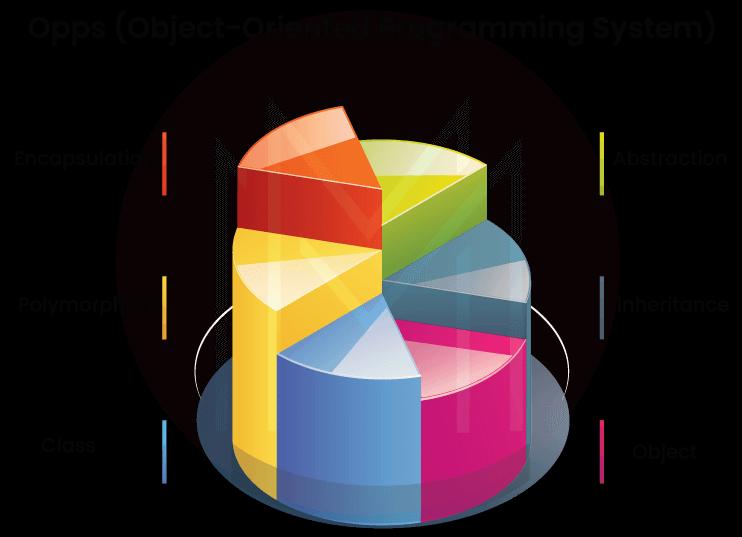
4. What is an Object in OOPs?
Objects are instances or subsets of classes. It is due to a physical operation, such as individual characteristics, qualities, and behavior. It occupies memory space and has defined member functions within a class.
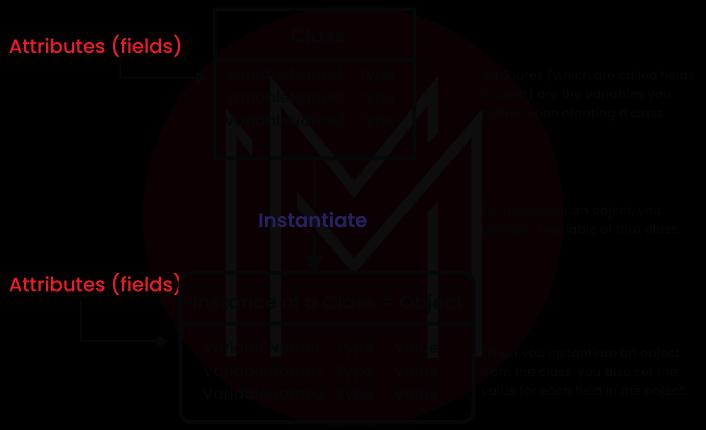
5. What is a Class in OOPs?
An object's class defines its shape and can only store information of a specific type. Class attributes, such as member functions, variables, and constants, are explicitly named. During operation, it does not consume any memory. In contrast to classes, objects have no existence outside of their own classes.
6. What are ‘access specifiers’?
In OOPs, keywords known as access specifiers or access modifiers are used to define which methods, classes, etc. are available to a given user. To put it another way, encapsulation can be realized with the help of these access specifiers. Access levels such as "public," "private," and "protected" are the most typical. Yet a few more are unique to the various programming languages.
7. What is a superclass in OOPs?
Any class that functions as a parent to other classes is called a superclass or base class. For instance, class Vehicle is a higher-level category than class Car.
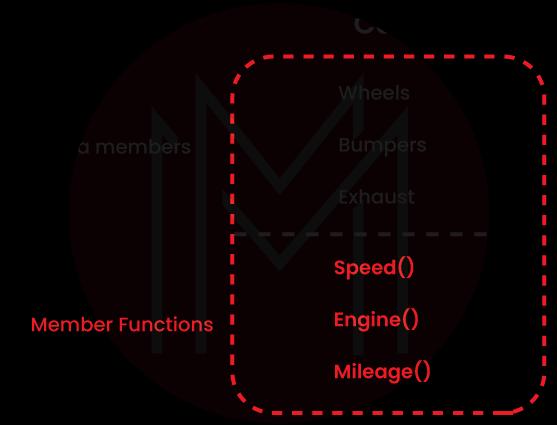
8. What is a try/ catch block?
A try/catch block is used to handle any exceptions that may occur. The try block initializes a collection of statements that might produce a runtime error. The exception is "caught" by the catch block in its most basic form.
9. What is Inheritance?
One of the most important parts of OOPs languages is inheritance. Inheritance is the process by which one class takes on another class's features, behaviors, and properties without having to recreate the code.
10. Mention some limitations of OOPs.
- It was time-consuming to develop and ran slower than other programs.
- In terms of size, it is more prominent than other programs.
- It is incorrect for some problems.
- It needs adjustments.
11. How is method overloading different from method overriding?
- Method overloading happens when two methods with the same name accept varying numbers of parameters or types of arguments. It is called compile-time polymorphism because it occurs during the compilation process.
- Method overriding is the capability to create subclass and superclass methods with identical names and signatures, with the subclass method taking precedence over the superclass method. Run-time polymorphism is a sort of polymorphism that happens while a programme is being executed.
Infosys Interview Questions and Answers on C, C++
12. What is the difference between C and C++?
C and C++ are both programming languages that share many similarities, but there are some key differences between the two.
|
C++ |
C | |
|
Language |
C++ is an object-oriented programming (OOP) language. This means that C++ allows for the use of classes and objects to encapsulate data and functionality |
C is a procedural programming language. C uses functions and data structures. |
|
Complexity |
C++ is generally considered more complex than C |
C is a simpler language that focuses on the basics of programming |
|
Libraries |
C++ has a larger set of standard libraries, including libraries for I/O, strings, and containers |
C has a smaller set of standard libraries |
|
Performance |
C++ are low-level languages |
C are low-level languages |
|
Compatibility |
C++ is largely backward-compatible |
C does not support many of the features introduced in C++ |
[ Releted Articles - C++ Interview Questions ]
13. Why does a software use the stdio.h file?
In the C programming language, stdio.h is a header file that provides input and output functions. It stands for "standard input-output header". Programs use stdio.h to perform basic input and output operations such as reading from and writing to files, standard input and output streams, and other devices.
14. Explain HTTP responses and requests
Web clients send HTTP requests to servers, telling them what resource they want and what action they want to take. HTTP responses are sent back to clients from servers. They say if the request was successful or not and include the resource that was asked for. HTTP Requests and responses can also include extra information, like headers, to give more context and details. Overall, HTTP responses and requests are the main way that clients and servers exchange information and talk to each other on the web.
15. What do you mean by return 0?
The return 0 statement can be utilized within other functions in order to return a value to the function that originally called it. In this case, the return value can be used for various purposes, such as error checking, status reporting, or passing data between functions.
16. How is encapsulation achieved in C++?
Encapsulation is the process of putting all your data into a single unit and hiding how it works from the people who use it. When we make the data members private, we can't get to them from outside the class. We have to use getters and setters to get to them.
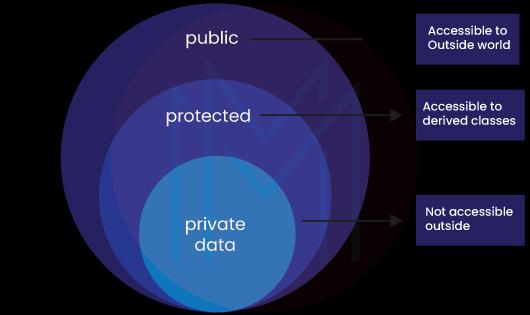
17. Give me one drawback of using C++.
There is no help for threads built in. If they want to know more, you can tell them that it doesn't work with trash collection.
[ Related Article - Golang Vs C++ ]
18. What is a friend function/class?
- Friend function – If a function is marked as a "friend" of a certain class, it can use the class's private and protected members.
- Friend class – If a class is designated as a friend of another class, it has access to that class's protected and private members.
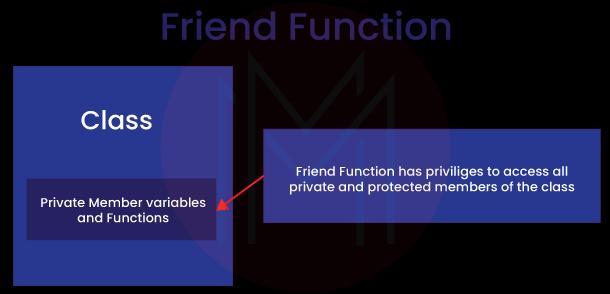
19. Describe how to determine if a linked list is circular.
To do this, make two pointers, and assign each one to the linked list's front. Update each as follows:
while (pointer1) {
pointer1 = pointer1->next;
pointer2 = pointer2->next; if (pointer2) pointer2=pointer2->next;
if (pointer1 == pointer2) {
print ("circular\n");
}
}20. What is a NULL pointer in C?
A pointer that doesn't point anywhere is called a NULL pointer. Such as int *p=NULL;
21. Is C low-level? If not, why is it sometimes?
Although C is generally classified as a high-level language due to its support for high-level programming language operations and its machine independence. It can also be considered a low-level language due to its support for direct memory access, raw pointers, and bit-oriented operation.
22. Explain tokens in C++
In C++, tokens are the smallest parts that make a lot more sense when they are all put together. Tokens can be things like separators, operators, literals, keywords, identifiers, and punctuation.

23. What is the Memory Allocation in C/C++?
- calloc(): When allocating memory with calloc(), the size of the space is calculated by multiplying the parameters by themselves. Every allocated memory is initialized to zeros and a pointer to the first byte is returned by the calloc() function. If it cannot find enough space, it will return a NULL pointer.
- malloc(): Using malloc() to allocate memory will use the given length. As an alternative to calloc and malloc, which populate the memory region, free() is used to free the memory that has been allocated. In addition to allocating heap space and initializing it with a function Object(), new can also be used to allocate memory.
- delete(): The memory allocated by the new operator is freed up when delete() is invoked.
24. Explain pointers in C++.
A pointer is a variable that stores the address of another variable of the same data type. Pointers can be constructed for any data type, including user-defined data types such as class, structure, etc. It permits variable reference passing using the address.
What are some of the key ways in which C++ and Java differ from one another? Which one do you prefer more, and why do you feel that way?
While C++ was developed for use in system and application development, Java is primarily a printing system interpreter and network computing platform. Java's portability across operating systems facilitates its learning by newcomers. C++ requires a specific operating system in order to run. Both are highly useful in their own contexts, and it would be unfair to compare them.
25. Define an array.
The array is a basic data structure that lets you store more than one item of the same type in a specific order. Arrays are classified into three types:
- One dimensional Array
- Two dimensional Array
- Multiple dimensional Array
[Releted Articles - Array Interview Questions ]
26. What are the different types of errors that can occur in C?
These are the two categories of C errors:
- Run-time errors
- Compile-time errors
Infosys Interview Question and Answers on DBMS and SQL
27. What is database Schema?
The database schema is a collection of formulas (sentences) that define the constraints placed on a database to ensure its integrity.
[ Releted Articles - DBMS Interview Questions ]
28. What is a Database Management System?
A DBMS is a software that enables the creation and maintenance of databases. A database management system enables the end-user to design and maintain databases. The database management system (DBMS) is the connection between the application/end user and the databases.
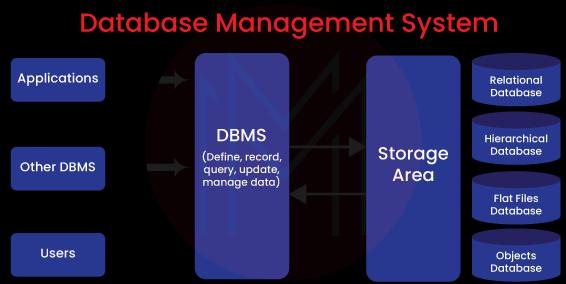
29. Explain RDBMS.
A Relational Database Management System (RDBMS) is a program that allows a programmer to interface with a database to add, modify, or delete data. This is performed by user queries (SQL). For instance, each data element could be a database row.
[ Related Article - HBase Vs RDBMS ]
30. Which languages are used to connect with databases?
- Data Control Language(DCL)
- Data Definition Language(DDL)
- Data Manipulation Language(DML)
- Transaction Control Language(TCL).
31. What are the DBMS advantages?
DBMS has many benefits, which are listed below:
- Improved data sharing
- Improved data access
- Improved decision making
- Improved data security
- Better data integration
32. What exactly is a stored procedure?
A set of statements that can be retrieved by programs that use an RDBMS is called a "stored procedure". These are saved in the database's data dictionary. It can be used to validate data and keep track of who has access to what.
33. How would you make a new project's database schema?
To build a database schema for a new project, one must evaluate the type and volume of data being stored, as well as the anticipated usage patterns and scalability requirements. It is also necessary to normalize the data to decrease redundancy and guarantee consistency. The data should be retrieved and manipulated using efficient queries, and database management systems such as PostgreSQL, MySQL, and MongoDB can be used to construct and manage the database structure.
34. Explain briefly about the SQL commands.
Some SQL commands are
- Data Definition Language (DDL)
- Data Manipulation Language (DML)
- Data Control Language (DCL)
- Transaction Control Language(TCL).
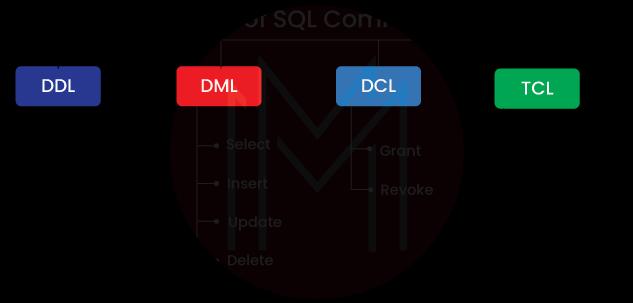
35. What are the different kinds of SQL keys?
In SQL Server, there are different kinds of keys.
- Candidate key
- Primary Key
- Foreign Key
36. What is the difference between ArrayList and Array?
Here are the ways that ArrayList and Array are different.
- The ArrayList can become very big. But the length of an Array is always the same.
- On the one hand, you can't store any primitives in an ArrayList. On the other hand, the Array is different because it is easy to store primitives.
37. How is a candidate key different from a super key?
Candidate keys in database management systems are the smallest possible set of attributes that can identify a tuple (row) in a relation (table), while super keys are the largest possible set of attributes that can identify a tuple, but may include attributes that aren't strictly necessary for uniqueness.
38. What are DML and DDL commands in SQL?
The term "Data Manipulation Language" (or "DML") refers to the language used to alter information stored in a database. UPDATE, INSERT, SELECT, and DELETE are all examples of such commands.
DDL, which stands for "Data Definition Language," is used to outline the framework for a database. Terms like "ALTER," "CREATE," and "DROP" are all examples of such commands.
Infosys Interview Questions and Answers on Computer Networks and Software Testing
39. What exactly is the difference between a socket and a session?
A session is a connection between where the communication comes from and where it goes. When implementing a session, a socket is a physical component (IP address and Port Number) that makes the connection possible.
40. What is the difference between UDP and TCP?
|
TCP |
UDP |
|
Segment sequencing |
No sequencing |
|
Connection-oriented protocol |
Connectionless protocol |
|
Reliable transmission protocol |
Unreliable transmission protocol |
|
Acknowledge sequencing |
No windowing and retransmission |
41. What are the disadvantages of the waterfall model?
- The waterfall approach is not user-friendly since it disregards the end product from the user's perspective.
- It lacks adaptability in terms of accommodating the change.
- It prohibits testing until the completion of the project.
42. What is SDLC?
The software development life cycle (SDLC) is a graphical representation of the software development process. It demonstrates the processes used throughout the software's life cycle, from initial design to regular updates and requirement analysis.
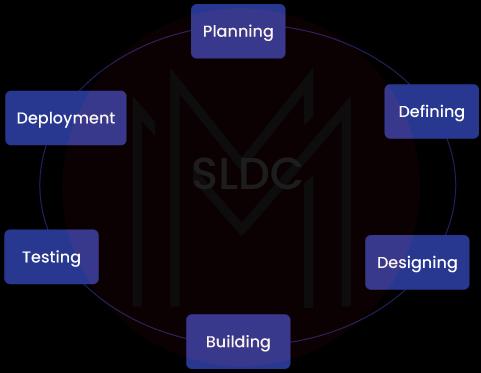
43. Which SDLC model is the most popular?
One of them is the waterfall model. The other is AGILE, which is becoming more popular because it uses a process called "continuous iteration," which makes mistakes less likely in a production setting.
[ Releted Article - SDLC Interview Questions and Answers ]
44. What is the difference between IPv4 and IPv6?
- IPv4 addresses are 32 bits long, while IPv6 addresses are 64 bits long.
- IPv4 can create 4.29 × 109 unique addresses, whereas IPv6 can be utilized to generate as much as 3.4 x 1038 unique addresses.
45. What are the various language levels?
One can use a higher or lower level of language depending on the
- Assembly level language
- Low-level language
- Middle-level language
- High-level language
46. What exactly is meant by the term "real-time operating system"?
Real-time operating systems connect users to computer hardware. Real-time OSes handle mission-critical activities. They act quickly. However, the functions are domain-specific. Real-time operating systems power robots, military systems, air traffic control, and more.
47. Tell me about a network and a node.
- A group of devices that are connected to one another by some form of physical transmission makes up a network.
- A node is an alternative term for a network-connected device. The network contains five nodes if two PCs, two computers, and a web server are connected.
48. What is the Agile model?
Agile is a software development methodology that employs an iterative approach to enable teams to deliver customer value more quickly, with fewer errors, higher quality, and greater adaptability to change. Scrum and Kanban are the most common Agile methodologies.
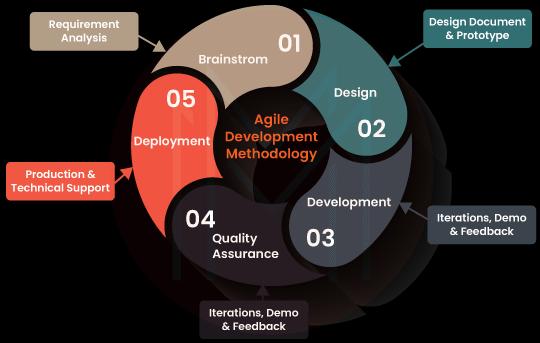
49. Differentiate between white box and black box testing.
|
White box testing |
Black box testing |
|
The tester will have a thorough comprehension of the application's inner workings. |
You are not required to comprehend the application's inner workings. |
|
It's up to the developers and testers (QA). |
End-users, developers, and testers are accountable for its maintenance. |
|
It involves more effort and time. |
It requires less effort and time. |
|
Here, a tester will create test data and test cases. |
End-user testing is carried out. |
|
Structural testing, Open-box testing, code-based testing, and clear-box testing are all synonyms for white-box testing. |
Data-driven, functional, and closed-box testing are other terms for black-box testing. |
Infosys Technical Interview Questions
An ideal set of Infosys technical interview questions, suitable for both inexperienced candidates and seasoned experts, has been developed by us. But before you begin, review the Infosys interview process and then start preparing for the interview..
50. Describe a few high-level programming languages.
C, Java, C++, Swift, JavaScript, Go, and PHP are the most used programming languages. (You can also talk about the languages you know very well. If you're ready for all of them, you'll definitely get extra credit here.
51. What is the difference between virtual and pure virtual functions?
Virtual function:-polymorphism requires the virtual modifier to be set on the base class functions. A virtual declaration on a base class function makes the execution of a derived class function conditional on the value of the pointer address.
Pure Virtual Function:-This is a base-class function that must be defined in a derived class. In contrast, a pure virtual function is defined as
virtual void fun()=0;
This function will have no effect, and in such a circumstance, the derived function must either implement a pure virtual function itself as a pure virtual function.
52. What does JAVA use for its virtual machine?
The Java virtual machine is referred to as the “JVM for short." The Java runtime environment is used to implement this word (JRE).
[ Related Article - Core Java Interview Questions ]
53. What are the Object Methods?
Some of the methods of objects are equals, clone, finalize, wait, hashCode, getClass, notifyAll, notify, toString.
54. What is the difference between Char and Varchar in DBMS?
Both Char and Varchar are DBMS data types. Char and varchar are both used to store up to 8000 characters.
The main difference between Char and Varchar is that Char is a string datatype with a fixed length, while Varchar is a string datatype with a variable length.
55. What are verification and validation?
Verification: Verification is the set of things done to ensure that software performs a certain function.
Validation: It's a group of things done to ensure that software is built to meet clients' needs.
56. What is a frame in HTML?
Frames in HTML are a convenient way to divide a browser window into many portions, each of which can load its own HTML file. Frameset refers to a group of frames that are shown together in the browser window.
57. Can we show a web page inside another web page?
Yes, it is possible to embed one HTML document into another HTML document. To accomplish this, we can use the iframe> tag that is available in HTML.
Example: <iframe src=”url of the web page to embed” />
58. What are the different types of DBMS?
- Relational database management system
- Network database systems
- Hierarchical database systems
- Object-oriented database systems
59. Mention the various kinds of arguments?
The different types of arguments are
- Call by Reference
- Call by value
Tips to Crack Infosys Interview
Here are some tips to help you prepare for and crack an Infosys interview:
- Research the company: Before the interview, research Infosys and its culture, values, and work environment. This will help you understand the company's expectations and align your answers with its goals and values.
- Review your resume: Be prepared to discuss your work experience, skills, and achievements. Review your resume and be ready to provide examples of how you have demonstrated your skills in past roles.
- Practice common interview questions: Prepare for common interview questions such as "Tell me about yourself," "Why do you want to work for Infosys," and "What are your strengths and weaknesses?" Practice your answers with a friend or family member to gain confidence and refine your responses.
- Brush up on your technical skills: Depending on the role you are interviewing for, you may be asked technical questions related to your area of expertise. Review your technical skills and practice solving problems or answering technical questions.
- Demonstrate your communication skills: Infosys places a strong emphasis on communication skills, so be prepared to demonstrate your ability to communicate effectively and clearly. Practice active listening, ask questions, and be confident in your responses.
- Show your enthusiasm and passion: Infosys values employees who are passionate about their work and who are committed to lifelong learning. Demonstrate your enthusiasm and eagerness to learn, and be prepared to talk about your goals and aspirations.
- Be professional and courteous: Dress appropriately, arrive on time, and be polite and courteous to everyone you meet. Remember to thank your interviewer for their time and follow up with a thank-you note or email after the interview.
By following these tips and preparing thoroughly for your Infosys interview, you can increase your chances of success and demonstrate your value as a potential employee.
FAQs For Infosys
1. What are the Infosys interview rounds?
Infosys follows three rounds of interview modes, they are
- Online Assessment Test
- Technical Interview
- HR Interview
2. How do I apply for a job at Infosys?
Infosys uses two ways to find new employees. One way is the old way: to hire right from campus. This has changed over time. Instead of going to the campuses, the Company has been giving a test called InfyTQ for a while now. So apply on the Infosys website directly and attend the online assessment.
3. How do I prepare for an Infosys online interview?
To prepare for an Infosys online interview, you must deeply understand concepts like
- At least one programming language.
- Algorithms and data structures.
- OOPS, DBMS, CN, and OS.
- Puzzles and Aptitude-based questions.
- Coding and problem-solving.
- Emerging technologies in your areas of interest.
4. What are some of the questions that one should ask the interviewer at Infosys?
- Tell me about yourself.
- Tell me about your education.
- Why are you interested in working for this company?
- Describe your interests/hobbies
- Why have you chosen this particular field?
- What is your major weakness?
5. How can I prepare for an Infosys interview?
You should comprehensively understand at least one programming language, data structures, operating systems, and other computer-related terms. Prepare beforehand by practicing the most likely questions, especially those pertaining to your areas of interest and academic accomplishments.
6. What are the basic questions asked in an Infosys interview?
- Explain pointers in C++.
- Explain four major OOP concepts in Java.
- Explain different levels of programming languages.
- Can we implement multiple inheritances in Java?
- What are DDL and DML commands in SQL?
- Distinguish between classes and interfaces in Java.
- What are the disadvantages of the Waterfall model?
- Explain the Agile model.
- What is SDLC(Software Development Life Cycle)?
7. Is an Infosys Interview easy?
The Infosys interview is not too hard and not too easy. You can easily get through all the rounds if you have good technical and communication skills. If you prepare well for your Infosys interview, you'll be able to answer any hard questions the interviewer throws at you.
8. Why should I hire you from Infosys?
This is the question that almost every company gets asked the most. If you're asked this, you can say something like, "I want to find a job that fits my passions and interests because I've learned I'm great at building logic and a great coder." As part of my classes in college, I made different kinds of software. I want to start my IT career with a well-known company, and I'm sure Infosys is the best place to learn more and get ahead."
Conclusion
We hope you found this information to be very interesting and helpful in preparing for your Infosys interview. Now, make sure you are well-prepared for every question, as this will help you understand the Infosys hiring process better. You can also get an idea from these Infosys interview questions of the kinds of questions you might be asked in an interview and how you should answer them to make the best impression on the interviewer.
Enrolling in a SQL Training Course will help you understand the course concepts and succeed in your Infosys interview.
 On-Job Support Service
On-Job Support Service
Online Work Support for your on-job roles.

Our work-support plans provide precise options as per your project tasks. Whether you are a newbie or an experienced professional seeking assistance in completing project tasks, we are here with the following plans to meet your custom needs:
- Pay Per Hour
- Pay Per Week
- Monthly
| Name | Dates | |
|---|---|---|
| SQL Basics Training | Feb 21 to Mar 08 | View Details |
| SQL Basics Training | Feb 24 to Mar 11 | View Details |
| SQL Basics Training | Feb 28 to Mar 15 | View Details |
| SQL Basics Training | Mar 03 to Mar 18 | View Details |

Madhuri is a Senior Content Creator at MindMajix. She has written about a range of different topics on various technologies, which include, Splunk, Tensorflow, Selenium, and CEH. She spends most of her time researching on technology, and startups. Connect with her via LinkedIn and Twitter .





